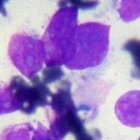Oncology
Oncology research articles, Oncology research article, Oncology journals, Oncology journal, Oncology articles, Research on Breast cancer, Oncology




 Latest news
Latest news
- Interview with Clinical Medicine Insights: Oncology editorial board member Prof. M. Wasif Saif
-
- 18/Jun/2010
- Interview with Biomarkers in Cancer editorial board member Dr Xiaofeng Zhou
-
- 18/Jun/2010
- Interview with Microbiology Insights editorial board member Dr Viroj Wiwanitkit
-
- 18/Jun/2010
- Interview with Cell & Tissue Transplantation & Therapy editorial board member Dr Terje Forslund
-
- 17/Jun/2010
- Interview with Nutrition and Metabolic Insights editorial board member Prof.Abdulaziz I.AL-Othaimeen
-
- 17/Jun/2010
- Interview with Biomarker Insights editorial board member Dr Steven R. Myers
-
- 16/Jun/2010
- Interview with Immunology and Immunogenetics Insights editorial board member Dr Robert Yarchoan
-
- 16/Jun/2010
- Interview with International Journal of Tryptophan Research editorial board member Dr Martin Reuter
-
- 15/Jun/2010
- Interview with Cancer Informatics editorial board member Dr Philip Crooke
-
- 15/Jun/2010
- Interview with Environmental Health Insights editorial board member Dr Lalita Bharadwaj
-
- 15/Jun/2010
- Interview with Integrative Medicine Insights editorial board member Dr Merrijoy Kelner
-
- 15/Jun/2010
- Interview with Clinical Medicine Insights: Reproductive Health editorial board member Dr Lior Lowenstein
-
- 15/Jun/2010
- Interview with Clinical Medicine Insights: Trauma and Intensive Medicine editorial board member Dr Michael Y. Wang
-
- 09/Jun/2010
- Interview with Environmental Health Insights editorial board member Dr Lars Carlsen
-
- 09/Jun/2010
- Interview with Evolutionary Bioinformatics editorial board member Dr Carsten Wiuf
-
- 04/Jun/2010
- Interview with Translational Oncongenomics Editor in Chief Dr Michael Spinella
-
- 04/Jun/2010
- Interview with Cancer Informatics editorial board member Dr Jimmy T. Efird
-
- 04/Jun/2010
- Interview with Journal of Cell Death editorial board member Dr Hardy Kornfeld
-
- 04/Jun/2010
- Interview with Journal of Cell Death editorial board member Dr Bruce S. Bochner
-
- 03/Jun/2010
- Interview with Cancer Informatics editorial board member Dr Bradley J Erickson
-
- 03/Jun/2010
- Biomarker Insights Editor in Chief co-author of Nature cover story
-
- 06/May/2010
- Author interview with Dr Esther Uña Cidón
-
- 26/Apr/2010
- Author interview with Dr Thomas Ostermann
-
- 24/Mar/2010
- Author interview with Dr Yoshihito Yokoyama
-
- 11/Mar/2010

 Latest articles
Latest articles
- Muscle Functions in Polymyalgia Rheumatica and Giant-Cell Arteritis
- Empyema Thoracis
- Increased Serum Cu/Zn SOD in Individuals with Clinical Depression Normalizes After Zinc and Anti-oxidant Therapy
- Insights into Protein Sequence and Structure-Derived Features Mediating 3D Domain Swapping Mechanism using Support Vector Machine Based Approach
- Utility of 4,5-Diphenylimidazol-2-thione in Synthesis of Fused Heterocyclic Ring Systems with Biological Interest
- Molecular Phylogeny of Edge Hill Virus Supports its Position in the Yellow Fever Virus Group and Identifies a New Genetic Variant
- Safety and Efficacy of Levonorgestrel 0.10 mg and Ethinyl Estradiol 0.02 mg Plus Ethinyl Estradiol 0.01 mg in an Extended-Cycle Oral Contraceptive Regimen
- Detection of Amide and Aromatic Proton Resonances of Human Brain Metabolites Using Localized Correlated Spectroscopy Combined with Two Different Water Suppression Schemes
- Fospropofol Disodium for Procedural Sedation: Emerging Evidence of its Value?
- Differential Human Plasma Proteomics Based on AniBal Quantification and Peptide-level Off-Gel Isoelectric Focussing
- Role of Metabolic Modulation in the Management of Chronic Ischemic Heart Disease
- Cellular Phone-Based Image Acquisition and Quantitative Ratiometric Method for Detecting Cocaine and Benzoylecgonine for Biological and Forensic Applications (Provisional PDF)
- Effectiveness and Safety of Rizatriptan Benzoate 10 mg in the Treatment of Migraine Headaches
- Editorial ISTRY Special Issue
- On the Biological Importance of the 3-hydroxyanthranilic Acid: Anthranilic Acid Ratio
- Accelerated Tryptophan Degradation Predicts Poor Survival in Trauma and Sepsis Patients
- Serum Levels of Tryptophan, 5-Hydroxytryptophan and Serotonin in Patients Affected with Different Forms of Amenorrhea
- Indoleamine 2,3-Dioxygenase in Human Hematopoietic Stem Cell Transplantation
- Proteasomal Degradation of Indoleamine 2,3-Dioxygenase in CD8+ Dendritic Cells is Mediated by Suppressor of Cytokine Signaling 3 (SOCS3)
- Effects of Acute Tryptophan Depletion on Three Different Types of Behavioral Impulsivity
Most read articles
- Current Status of Monocyte Differentiation-Inducing (MDI) Factors Derived from Human Fetal Membrane Chorion Cells Undergoing Apoptosis after Influenza Virus Infection
- Relationship Between the Plasma Concentration of C-Reactive Protein and Severity of Peripheral Arterial Disease
- Intraspecific ITS Variability in the Kingdom Fungi as Expressed in the International Sequence Databases and Its Implications for Molecular Species Identification
- Clinical Presentation and Histologic Findings at Ileocolonoscopy in Children with Autistic Spectrum Disorder and Chronic Gastrointestinal Symptoms
- A Simple Derivation of the Distribution of Pairwise Local Protein Sequence Alignment Scores
- DICOM Structured Reporting and Cancer Clinical Trials Results
- Mammoth and Elephant Phylogenetic Relationships: Mammut Americanum, the Missing Outgroup
- Evaluation of Two Outlier-Detection-Based Methods for Detecting Tissue-Selective Genes from Microarray Data
- Exploring the Evolutionary History of the Differentially Expressed Genes between Human Populations: Action of Recent Positive Selection
- Systems Biology-Based Identification of Crosstalk between E2F Transcription Factors and the Fanconi Anemia Pathway
- On the Adaptive Design Rules of Biochemical Networks in Evolution
- Phylogenetic diversity (PD) and biodiversity conservation: some bioinformatics challenges
- Identification and Quantitation of Asparagine and Citrulline Using High-Performance Liquid Chromatography (HPLC)
- Fast Genes and Slow Clades: Comparative Rates of Molecular Evolution in Mammals
- In Silico Promoter Analysis can Predict Genes of Functional Relevance in Cell Proliferation: Validation in a Colon Cancer Model
(previous 30 days)Site updates
Journal: Clinical Medicine Insights: Oncology
Journal: Breast Cancer: Basic and Clinical Research
Journal: Clinical Medicine Insights: Case Reports
Journal: Cancer Growth and Metastasis
Journal: Lymphoma and Chronic Lymphocytic Leukemias
Journal: Indian Journal of Clinical Medicine
Recent Pharmacological Advances in the Treatment of Acute Lymphoblastic Leukaemia (15/Jun/2010)
Acute lymphoblastic leukaemia (ALL) is the most common leukaemia in children and third most common in adults. Although the majority of children and adults with ALL achieve a complete remission with intensive chemotherapy, relapse will occur in 20% and 50% respectively. As further intensification risks greater toxicity and may not...
The agents currently approved for use in metastatic renal cell carcinoma (mRCC) can be divided broadly into two categories: (1) vascular endothelial growth factor receptor (VEGFR)-directed therapies or (2) inhibitors of the mammalian target of rapamycin (mTOR). The latter category includes everolimus and temsirolimus, both approved for distinct indications in...
Targeted Therapy for Locally Advanced or Metastatic Non-Small Cell Lung Cancer—Patient Selection Changes the Fate of Gefitinib (24/May/2010)
Non-small cell lung cancer (NSCLC) presents one of the greatest clinical challenges in oncology. The prevalence of cigarette smoking is the major cause for the high incidence that makes NSCLC the commonest cause of cancer-related death in the western world. Patients frequently present late, with locally advanced or metastatic disease....
We present the case of a 67-year-old man with a three month history of right sided facial nerve palsy reporting to our clinic for evaluation of a recently seen suspicious mass in the right lung. Subsequently he was diagnosed with advanced NSCLC right lung and started on palliative chemotherapy. Furthermore,...
Cetuximab: The Emerging Evidence of its Therapeutic Value in Squamous Cell Carcinoma of the Head and Neck (19/May/2010)
The worldwide incidence of head and neck cancer exceeds half a million cases annually with squamous-cell histology as the most predominant. Almost half of newly diagnosed cases have advanced disease at diagnosis. The high morbidity and mortality associated with the malignancy has brought more attention to this cancer. The improvement...
Review of Palonosetron in the Prevention of Chemotherapy-Induced Nausea and Vomiting (18/May/2010)
Palonosetron, the second generation 5-hydroxytryptamine-3 receptor antagonist (5-HT3RA), has shown superior efficacy in preventing the delayed phase of highly emetogenic chemotherapy induced nausea and vomiting (CINV) when administered in combination with dexamethasone in a randomized phase III trial, as compared with granisetron, a first generation drug in the same class....
Platinum and Pemetrexed Combination in Advanced Solid Tumors (17/May/2010)
Pemetrexed is a third generation multi-target agent able to inhibit at least three crucial enzymes involved in the folate pathway. Pemetrexed is indicated in combination with cisplatin as first line treatment of malignant pleural mesothelioma (MPM) and in mono-chemotherapy as second line treatment of advanced non-small-cell lung cancer (NSCLC). In...
Degarelix in the Treatment of Prostate Cancer (13/May/2010)
Manipulation of the hypothalamic-pituitary-gonadal axis via androgen deprivation therapy has been in use since the 1940’s for the treatment of advanced prostate cancer. Androgen deprivation may be achieved via surgical castration or pharmacological castration. Pharmacological castration is preferred by patients due to its decreased psychological impact on body image and...
Metastatic Breast Cancer: Focus on Capecitabine (11/May/2010)
Capecitabine is an oral 5-fluorouracil pro-drug with activity in metastatic breast cancer. As a single agent, response rates of 30%–30% and 15%–30% have been reported in first-line and more heavily pretreated populations, respectively. Capecitabine in combination with chemotherapy and biologic agents has resulted in significant improvement in the clinical...
A Review of Dutasteride as Monotherapy in Benign Prostatic Hyperplasia (05/May/2010)
Treatment of benign prostatic hyperplasia (BPH) has evolved over that last 10 years consequent to the results of several important clinical trials. Although the primary concern for patients is their symptoms, we as urologists are further concerned about the progression of disease and complications of the disease. Two classes of...
The Pharmacology of Trastuzumab and Its Use in Breast Cancer (03/May/2010)
Trastuzumab is a therapeutic humanised monoclonal antibody targeting the Her2 receptor tyrosine kinase. Her2 is over-expressed, due to gene amplification, in approximately 30% of breast cancers and confers a worse prognosis. Trastuzumab has been used clinically for over a decade and is now used routinely in the treatment of Her2-positive...
Imiquimod 5% Cream: A Review of Its Safety and Efficacy in the Management of Superficial Basal Cell Carcinoma (28/Apr/2010)
Imiquimod 5% cream (Aldara) was approved by the Food and Drug Administration for the treatment of non-facial superficial basal cell carcinomas (sBCC) in 2004 and has become one of the most commonly used topical treatments for this variant of basal cell carcinoma. Application of the cream once a day, 5...
Melatonin, a Promising Role in Taxane-Related Neuropathy (28/Apr/2010)
Purpose: Melatonin has neuroprotective effects in animal studies and has been suggested to decrease adverse reactions of chemotherapy including neuropathy. This pilot trial aimed at assessing whether melatonin, given during taxane chemotherapy for breast cancer, will decrease the incidence and/or severity of neuropathy. Methods: Twenty two consecutive patients beginning chemotherapy...
Capecitabine Associated Hand-Foot Syndrome: A Review (21/Apr/2010)
Hand-foot syndrome (HFS), also known as palmar-plantar erythrodysesthesia, is a relatively frequent dermatologic toxic reaction associated with several chemotherapeutic drugs used in cancer treatment. The lesions are typically localised in the palmar and plantar surfaces of the hands and feet in patients who are taking oral capecitabine or other drugs...

Full-text PDFAbstract
Classical and Novel Prognostic Markers for Breast Cancer and their Clinical Significance (20/Apr/2010)
The use of biomarkers ensures breast cancer patients receive optimal treatment. Established biomarkers such as estrogen receptor (ER) and progesterone receptor (PR) have been playing significant roles in the selection and management of patients for endocrine therapy. HER2 is a strong predictor of response to trastuzumab. Recently, the roles of ER as a negative and HER2 as a positive indicator for chemotherapy have been established. Ki67 has traditionally been recognized as a poor prognostic factor,...
Hemorrhagic Cystitis in a Patient Receiving Docetaxel for Prostate Cancer (15/Apr/2010)
A case is reported in which docetaxel was used to treat a patient with hormone refractory metastatic prostate cancer. The treatment was terminated at the third course of docetaxel following the development of hemorrhagic cystitis. This reaction was unexpected, as it is not a known reaction to docetaxel. Hemorrhagic cystitis...
Management of Chronic Myeloid Leukemia with BCR/ABL Inhibitors: Current Status and Future Perspectives (13/Apr/2010)
Chronic myeloid leukemia (CML) is a hematopoietic neoplasm characterized by the Philadelphia chromosome (Ph) and the BCR/ABL oncoprotein. In chronic phase (CP) CML, leukemic cells display multilineage differentiation and maturation capacity. The BCR/ABL inhibitor imatinib exerts profound antileukemic effects in these patients and is considered standard frontline therapy. However, not...
Anastrozole Versus Exemestane in Patients with Postmenopausal Breast Cancer and Visceral Metastases (31/Mar/2010)
Background: For patients with hormone receptor positive metastatic breast cancer (MBC), both steroidal and non-steroidal aromatase inhibitors (AIs) have demonstrated efficacy as initial and subsequent lines of treatment in trials comparing them with other hormonal agents like tamoxifen and megestrol acetate. Patients with MBC and predominant visceral involvement have...
Everolimus: Emerging Evidence of its Therapeutic Impact in Patients with Advanced Renal Cell Carcinoma (31/Mar/2010)
The treatment of patients with advanced renal cell carcinoma (RCC) has been revolutionized by the development of agents directed against vascular endothelial growth factor (VEGF) signaling. These agents, such as sorafenib and sunitinib, have been advocated as first-line treatments for RCC. However, responses to these agents are neither complete nor...
Hormone Receptor Positive Early Breast Cancer: What Role for Aromatase Inhibitors? (26/Mar/2010)
Breast cancer is a significant problem worldwide. Five years of Tamoxifen has been the established endocrine adjuvant therapy for both pre- and post-menopausal women for several decades, until the more recent introduction of AI’s for use in post-menopausal ER-positive EBC. There are three third generation AI’s currently available commercially these...
A Phase II Study of S-1 Monotherapy as a First-line Combination Therapy of S-1 Plus Cisplatin as a Second-line Therapy, and Weekly Paclitaxel Monotherapy as a Third-line Therapy in Patients with Advanced Gastric Carcinoma: A Second Report (24/Mar/2010)
Background: We have previously reported on a Phase II study of S-1 monotherapy as a first line, combination therapy of S-1 plus cisplatin as a second line, and weekly paclitaxel monotherapy as a third line therapy in patients with advanced gastric carcinomas. The median survival time (MST) of patients over...
The Role of Imatinib in Philadelphia Chromosome Positive Acute Lymphoblastic Leukemia (19/Mar/2010)
Incorporation of imatinib, a BCR-ABL tyrosine kinase inhibitor, into treatment regimens for Philadelphia-chromosome positive acute lymphoblastic leukemia (ALL) has improved outcomes. Single agent therapy, as well as imatinib in combination with chemotherapy demonstrates high response rates, however durable remissions are rare due to rapid development of resistant disease. The only...
Chemotherapy-induced Nausea and Vomiting: Pharmacotherapy Update and Trends for Better Control (17/Mar/2010)
Nausea and vomiting are major concerns for patients who have to receive chemotherapy for an underlying malignancy. In this review, these concerns faced by patients receiving chemotherapy are presented along with discussion of the mechanisms of chemotherapy induced nausea and vomiting. Major targets of the 5HT3 antagonists, the NK1...
Pancreatic adenocarcinoma is associated with advanced presentation and poor survival. Currently approved therapies have minimal effect on patient survival. Pancreatic adenocarcinomas have a high incidence of activated K-RAS, which may confer resistance to epidermal growth factor receptor (EGFR) inhibitors. Mixed lineage kinase-3 (MLK3) is a MAP3K that activates multiple MAPK...
Brief Review of Vorinostat (18/Feb/2010)
The histone tails of histone octamers play an intricate role in transcription, and aid the histone interaction and binding with the negatively charged DNA phosphate backbone. Histone acetyl transferases and histone deacetylase inhibitors respectively accomplish acetylation and deacetylation of the lysine residue of the histone tail. Vorinostat is the first...
Metastatic Renal Cancer: What Role for Everolimus? (18/Feb/2010)
Metastatic renal cell carcinoma is uncommon (only 3% of cancers worldwide) but of poor prognosis. Renal cell carcinoma has traditionally been treated with cytokines (interferon-α or interleukin-2). More recently, a more clear understanding of the molecular and cellular mechanisms of the disease, involving the VEGF receptor and mTOR, has led...
Rituximab, a genetically engineered chimeric monoclonal antibody that specifically binds to CD20, is the first monoclonal antibody approved for the treatment of B-cell lymphoma. The addition of rituximab to chemotherapy has improved progression-free survival and overall survival for patients with diffuse large B-cell lymphoma (DLBCL) and follicular lymphoma. Rituximab-CHOP therapy...
The Treatment of Advanced Breast Cancer: Focus on Fulvestrant (16/Feb/2010)
Fulvestrant (Faslodex®) is an estrogen receptor antagonist with no agonist effects that competitively binds to the estrogen receptor with greater affinity than tamoxifen. A systematic review was performed to understand the pharmacology and to examine the evidence supporting the clinical use of fulvestrant in the first-line and second-line settings in...
Cancer patients undergoing chemotherapy are particularly susceptible to drug-drug interactions (DDIs). Practitioners should keep themselves updated with the most current DDI information, particularly involving new anticancer drugs (ACDs). Databases can be useful to obtain up-to-date DDI information in a timely and efficient manner. Our objective was to investigate the DDI...







